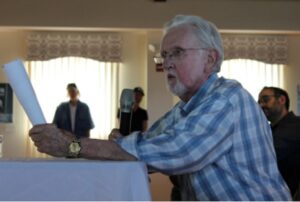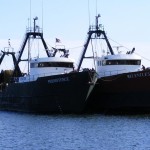A Pyrrhic Victory? By Sean McKeon
 On November 25, 2013 Federal District Court Judge Terrence W. Boyle1 ruled that Willie R. Etheridge III and Mark Cordeiro, two men from North Carolina, were not guilty of finning sharks as presumed under a federal fishing law prohibiting shark fin-to-carcasses ratios in excess of 5%. (Shark Finning Prohibition Act) The case is interesting not only because of what it produced by way of the district court’s decision, but also, and perhaps more importantly, because of the long history that ultimately spawned the government’s prosecution of these particular North Carolinians and the political environment in which it occurred.
On November 25, 2013 Federal District Court Judge Terrence W. Boyle1 ruled that Willie R. Etheridge III and Mark Cordeiro, two men from North Carolina, were not guilty of finning sharks as presumed under a federal fishing law prohibiting shark fin-to-carcasses ratios in excess of 5%. (Shark Finning Prohibition Act) The case is interesting not only because of what it produced by way of the district court’s decision, but also, and perhaps more importantly, because of the long history that ultimately spawned the government’s prosecution of these particular North Carolinians and the political environment in which it occurred.
The highly politicized agencies of the federal government are most to blame here, in this case National Marine Fisheries Service (NMFS) and its parents National Oceanic and Atmospheric Administration (NOAA), and the U.S. Department of Commerce. For an industry accustomed to bad news and never ending harassment by the very agency established to promote and protect it, the temptation might be to view this court victory in a vacuum and attach far too much optimism to its outcome. While there is certainly cause for celebration, it is important to understand the historic underpinnings of this case and the devastating impact federal agencies often have on the private sector when left unchallenged and undisciplined by those charged with their oversight, i.e. members of Congress and, in this case, the Administrative Law Court System (ALC).
National Marine Fisheries Service would be averse to adjudicating many of their cases if it were not for the abdication of responsibilities and duties by Administrative Law Judges (ALJ) who are far too willing to show deference to government agencies even when it is clear those agencies are not operating in good faith. NMFS understands it will more than likely prevail in an environment where the arbiter of disputes is likely to validate government actions under a cozy if not suspect relationship. For example, according to published reports, early in 2000 ALJ Parlen McKenna attended a workshop in Kuala Lumpur, Hawaii with NOAA prosecuting attorneys, Charles Juliand and Mitch MacDonald who had a case before McKenna. According to Special Master Charles B. Swartwood III, who was charged with following up on an Inspector General’s report highly critical of the Agency, this “presented an actual conflict of interest,” or, at the least, “created the appearance of a conflict”. McKenna was the ALJ in the Etheridge/Cordeiro case referenced here.
The bottom line is this case should never have been brought but for the overzealousness of bureaucrats who are schooled in revenge and possess little, if any, of civilized society’s respect for the rule of law and decency. They also know there is little if any down side to prosecuting in a court system (ALC) rigged to find for the Agency. Today, as a result of this and myriad other cases, lives and businesses have been ruined, and a once thriving shark industry barely exists save a few fishermen who operate at the complete whims and wishes of the National Marine Fisheries Service. Interestingly, when appeals wind up in federal court, and the veil of secrecy and inside dealing is exposed by the scrupulous eye of a judge who actually wants to find truth, the results are often quite different.
In 1997 a lawsuit was initiated against NMFS which challenged the 1997 commercial harvest quotas for Atlantic large coastal sharks (“LCS”), small coastal sharks (“SCS”), and pelagic sharks pursuant to the judicial review provisions of the Magnuson-Stevens Act (“Magnuson Act”) and the Regulatory Flexibility
Act (“RFA”). In 1998 Judge Steven D. Merryday entered an order “upholding the quotas against attacks on the scientific method and theory underlying the quotas but rejecting NMFS’s putative analyses of the economic effects of the quotas on small business.” (Emphasis mine) Throughout his ruling Judge Merryday was careful to point out the many and serious flaws in the Agency’s analysis of the consequences of its actions on the fishing public as well as the overzealous and contemptible behavior of NMFS. For example, he lambasted the Agency for not undertaking a legally required Initial Regulatory Flexibility Analysis, choosing instead to put forward a Final RFA (FRFA) making sure the public would have no opportunity to weigh in on the draconian quota reductions put forward by the Agency. “NMFS chose an insular approach designed to block further investigation and public scrutiny.” Merryday wrote. Adding that, “NMFS compounded this error by preparing a FRFA that constitutes an attempt to agreeably decorate a stubborn conclusion.” He was not amused and made his feelings known in a scathing refutation of almost all of the Agency’s claims and actions during litigation. Willie R. Etheridge Seafood was one of the plaintiffs in this case, the fish house where Mark Cordeiro packed his sharks.
Merryday continued his appraisal of the Agency’s conduct in strongly worded language that not only scolded, but, moreover, let the Agency know that he was keenly aware of and well versed in the issues at hand. “The apparent lapses and inconsistencies in NMFS’s analyses are perhaps attributable to the agency’s studied underestimation of the economic privations suffered by directed shark fishers at the hands of government regulators who lured them into dependence in the first instance.” (Emphasis added) The dirty little secret of the United States shark fishery is that it was, indeed, the federal government that “lured” industry into the fishery. After years of the industry establishing businesses and infrastructure to deal with the relatively new fishery, the United States Government, at the bequest of various Non-Governmental Organizations pulled the rug out from under it resulting in severe economic hardships and the resultant cases cited here. But it got even worse, and Judge Merryday expressed outrage at the Agency’s continued conduct in this matter.
Merryday’s decision left in place the 1997 quotas while the analyses of the economic impacts were to be completed. His February 1998 orders to the Agency were unequivocal and clear; “the status quo should persist…” In June of 1999 NMFS issued an order further reducing quotas in direct violation of Judge Merryday’s order. Judge Merryday had enough. He wrote, “NMFS is an agency willing to pursue its institutional objectives without acknowledging applicable Congressional and judicial limitations.” Something industry has known for a long time. And then he got to the heart of the matter, declaring, “Allowing a government agency to circumvent the judicial process by permitting the agency to promulgate intervening and incongruous regulations emasculates and disarms completely the remedial mechanism intended by Congress to detect, correct, and prevent reckless and unlawful rule-making. At some point the judicial process must catch up to the regulatory process.” He stopped just short of a contempt charge. The anger of the Agency would lie dormant for years, waiting for an opportunity to resurrect and find a way to punish those it blamed for its embarrassing treatment at the hands of a federal district court judge. Who better than those who financed the lawsuits?
Several members of the directed shark fishery industry, who had either been plaintiffs in the 1997 case or helped fund it, have been purposefully driven out of the business by the federal government and its agents working in consort. Some had businesses shut down and were thrown into prison, some were given exorbitant fines in excess of several million dollars for baseless charges, and others, like Etheridge and Cordeiro left the industry after permit sanctions and the fear of additional reprisals and prosecutions made continuing in the directed shark industry impossible. Lest anyone think the industry is overreacting, the 2009 Inspector General Report details the “systemic” abuses of the industry at the hands of NOAA Enforcement. Commenting on the Report, Senator Olympia Snowe from Maine stated “I am appalled at the stunning breadth and depth of the Inspector General’s findings of gross mismanagement within all levels of NOAA’s law enforcement community.” Remember Judge Merryday’s assessment of NMFS,
calling it an “agency willing to pursue its institutional objectives without acknowledging applicable Congressional and judicial limitations.” Breaking the law was never a problem either. But back to the Etheridge/Cordeiro case.
For years fishermen and industry leaders had been telling NMFS that its rule prohibiting a shark fin-to carcass ratio in excess of 5% was arbitrary and not based on real life experience in the fishery. Dewey Hemilright, (a member of the Mid-Atlantic Fisheries Management Council, and a 2012 National Fisherman Highliner of the Year), who participated in the shark fishery understood the presumption that needed rebutting. Soon after the initial Etheridge/Cordeiro hearing Hemilright, with the aid of members of the North Carolina Division of Marine Fisheries, undertook an experiment to show that it is not only reasonable to be over 5%, but also, probable, when fishing practices utilized by most shark fishermen are taken into account; practices such as keeping eight fins instead of four, leaving excess meat on the fins, and carving waste material from shark carcasses. Although not an “official” scientific undertaking the experiment showed beyond any doubt that shark fishing practices in North Carolina produced a product that was consistently over the 5% limit. Further, this fact was underscored by law enforcement when, as was testified to at the Etheridge/Cordeiro hearing before McKenna, they had been telling fishermen for years that as long as they had fins and corresponding carcasses percentages did not matter. This is a crucial part of the story because even Judge McKenna stated, “without the benefit of the statutory presumption, the Agency’s case would not stand.” But he allowed it to stand despite his own correct interpretation of the statute by creating an entirely different standard to judge Etheridge and Cordeiro.
The problem for NMFS is that it has become the amen corner for radical environmentalism and because the shark is one of the poster children for so-called conservation, the Agency’s “institutional objectives” changed from promoting a healthy, American fishery to regulating commercial fishermen out of the business without regard to due process or the rule of law. The ALJs, in this case Judge McKenna, actually advocated for the Agency by helping it piece together an outcome in search of a legal theory. As both the 1997 case and the recent district court case show, NMFS is not averse to changing the rules whenever it feels it is being beaten by them. For example, in the Etheridge/Cordeiro case NMFS changed the charges against the men several times finally settling on an interpretation of the law that was fatally flawed. In their minds a rebuttable presumption equaled guilt with absolutely no room for discussion, and, right on cue, Judge McKenna agreed.
The statutory requirement (carefully worded and written by Congress) allowed the shark finning presumption to be rebutted by “reliable, credible, and probative evidence” which Etheridge and Cordeiro were able to do rather easily using, amongst other things, the Hemilright data and experiments. With no thought of irony crossing his mind ALJ McKenna then created an “Alternative Violation Threshold” (AVT) above the 5%, in effect agreeing with Etheridge and Cordeiro that they had good (credible) evidence and reasons for being above 5%. Remarkably, however, he then held the men accountable for a new, higher threshold having all but admitted the 5% level was successfully rebutted. McKenna found his theory justifying his earlier guilty verdict. Interestingly, he also reduced the fines levied in his original decision from 18 charges at ten thousand dollars per charge ($180,000), to 13 charges at $1,500 per charge ($19,500). In doing so, McKenna, perhaps unwittingly, underscored the successful rebuttal of the 5% rule in at least five of the charges; making his “Alternative Violation Threshold” theory a dangling piñata waiting for the stick of a more serious judicial review to smash it to pieces. Enter Judge Boyle.
But, an “alternative” threshold means the old one (5%) could not hold up under evidence and the testimony of Etheridge and his colleagues; this was a major reason federal district court Judge Boyle threw cold water on the Agency’s and Judge McKenna’s “arbitrary and capricious” analysis of the statute and ruled for Etheridge and Cordeiro. Both he, and Judge Merryday in the 1997 case, were keenly aware of the Agency’s shenanigans during adjudication and ruled appropriately. Their decisions in these cases should provide ample precedent and legal cover for serious reform at NMFS and with the Administrative Law Courts. Unfortunately, the United States Congress has not addressed, in any meaningful fashion, either the glaring problems with NMFS highlighted in the two lawsuits discussed here, or the systemic problems cited in the Inspector General’s Report of 2009. In many ways the problems have gotten worse.
In his book “Terms of Engagement” attorney Clark M. Neily III refers to problems with certain type cases, stating, “Judges are required to help the government win rational basis cases [which ALJ cases are at root] by abandoning judicial neutrality and serving as courtroom advocates for one party in a legal dispute. This would be an outrage in any other setting, and a clear violation of judicial ethics. But in Rational Basis Land [or ALJ Land], it’s just another day at the courthouse.” ALJ McKenna gave the Agency another bite at the apple by moving the goal posts after their finning accusations were wholly rebutted. Fixing this institutional type problem would go a long way towards making sure prosecutions could pass legal muster on the merits of the case, not because the adjudicating process was a slam dunk for the government.
In the end, the verdict in Etheridge/Cordeiro v. U.S Department of Commerce, et al. is a good one, albeit enormously costly in both treasure and time. It may even serve as some sort of model for persistence by men who had had enough of what Judge Merryday called NMFS’s contempt for the judicial process. In plain fact, however, it was Mr. Etheridge’s obstinate refusal to admit guilt when neither he nor Mr. Cordeiro had violated the law, his belief that a “real” judge would rule in his favor, and his ability to finance an almost eight year court battle that is the story. Commenting on this story, Etheridge noted how frustrating and extremely aggravating it is to recall all of this; to see what he and his business and family have gone through at the hands of his own government, and then to realize his elected officials have done precious little, if anything, to see that changes come to this terrible system and fisheries management.
Wikipedia defines a Pyrrhic victory as a victory with such a devastating cost that it is tantamount to defeat. Someone who wins a Pyrrhic victory has been victorious in some way; however, the heavy toll negates any sense of achievement or profit. Etheridge, in his pursuit of justice, has done a noble and honorable thing for an industry he loves and that has been very good to him; he has held its managers liable. Hopefully, his effort will achieve more far reaching objectives in terms of substantive change in fisheries management and political accountability, and allow his retirement years a well-deserved sense of personal and professional achievement.
Sadly, most Americans and, certainly, most fishermen, cannot afford a long protracted fight against the national government, even when they know they are innocent. The government banks on that fact. Perhaps in this case the “judicial process [did] catch up to the regulatory process” to paraphrase Merryday, but until and unless the legislative process catches up to the regulatory process, and Congress exercises its authority, the out of control agencies in our country will continue to run roughshod over the citizens of our ever-vanishing Republic.
**Sean McKeon was the president of the North Carolina Fisheries Association during the
Etheridge/Cordeiro hearings and appeals.**
SOUTHERN OFFSHORE FISHING ASS’N v. DALEY, 55 F.Supp.2d 1336 (1999), United States
District Court, M.D. Florida, Tampa Division., June 30, 1999.












































Leave a Reply